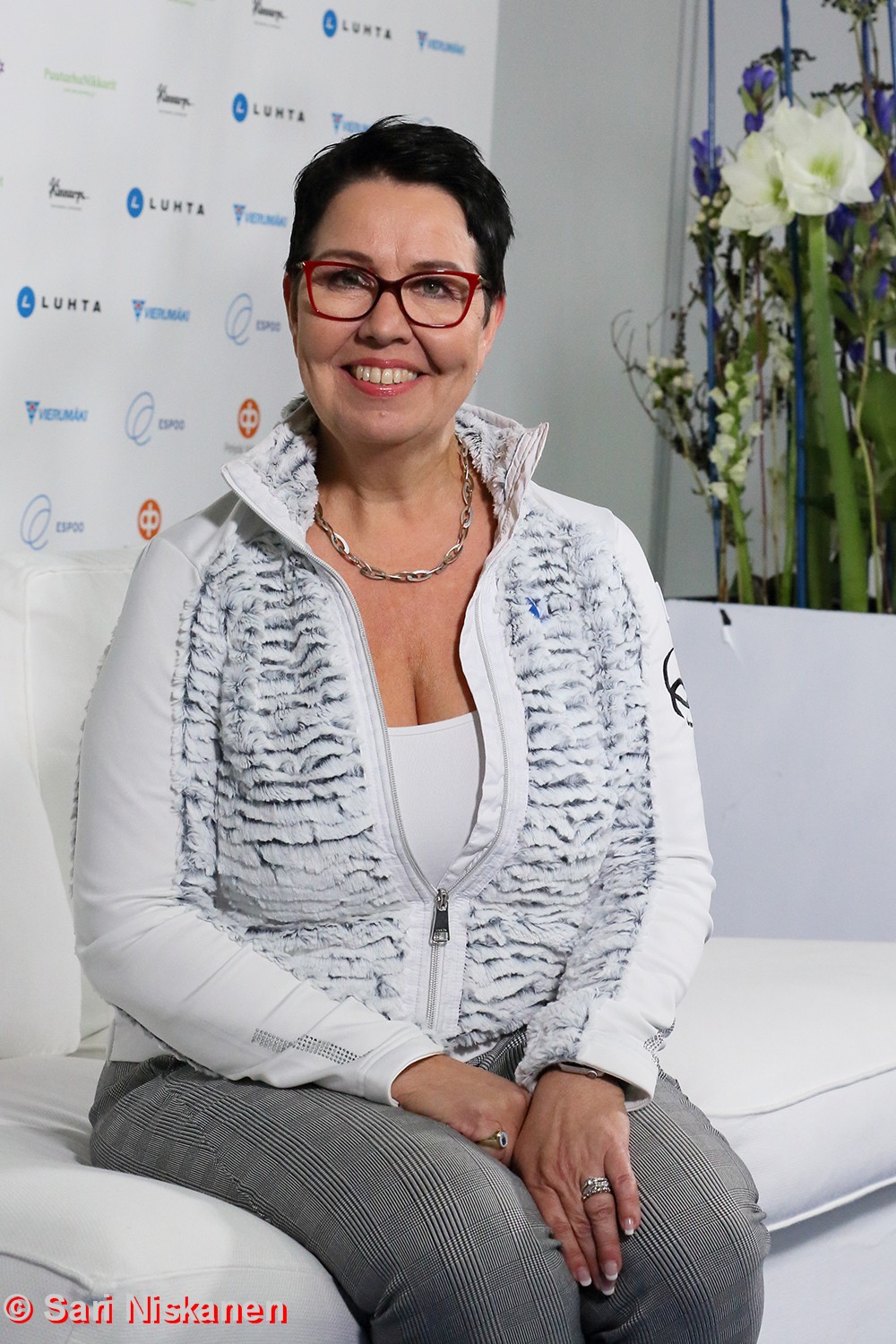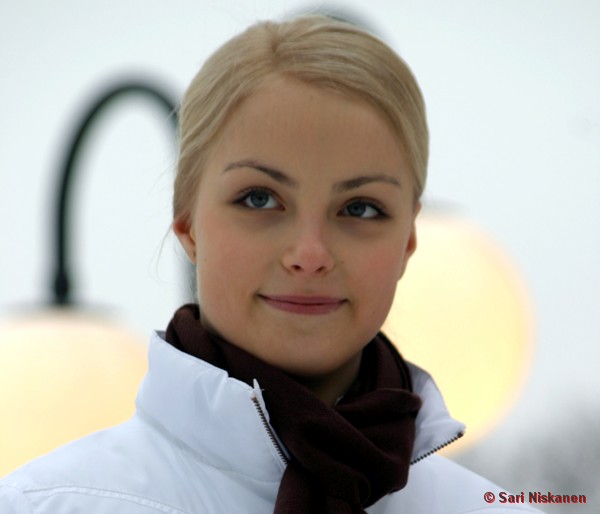Outi Wuorenheimo on progress in figure skating, coaching and athletes' health
November 21, 2019
By Fred Jacobsen
Photos © Igor Dolgov, Sari Niskanen, Oxana Shkrebtienko (LMDJ)
 Figure skating, like any other sport, has always developed with time. There are ongoing discussions on success achieved by skaters, difficulty of technical elements, coaching methods, skaters' health.
Figure skating, like any other sport, has always developed with time. There are ongoing discussions on success achieved by skaters, difficulty of technical elements, coaching methods, skaters' health.
Outi Wuorenheimo, General Secretary of Finnish Figure Skating Association (FFSA), shared her opinion on the situation in figure skating.
"We support all coaching that is done under the conditions of the athlete's physical and mental development. We also want to believe that ISU is awake and observes the difficulty of elements with rules and regulations."
It is not a secret that injuries occur in sport, and figure skating is not an exception: for example, Finnish skater Viveca Lindfors withdrew from the 2019 World Championships due to injury last season.
"FFSA follows the ISU rules in figure skating and supports the Finnish skaters and coaches to do their best at this sport," states Outi Wuorenheimo. "Skaters' health is a very important and strategic topic for us. We support the skaters and coaches so that they have the latest knowledge of how to avoid injuries in the sport and how to recover from possible injuries the best possible way. For example, when FFSA hosted the 2017 World Championships, an international seminar "Healthy Skater" was organized in Helsinki. Similarly, the ISU Development in cooperation with ISU Medical Commissions has organized an annual seminar on this topic."
Because of high level of competition and success that female skaters achieve at the agea of 15-16, there are ongoing discussions on age restriction for senior female skaters.
"I think one may argue forever, what is the right age of the skater to skate in the senior level. In my opinion, if we call the discipline "Ladies", the look and feel should be adult-like not girlish," opined Outi Wuorenheimo.
Nowadays, skaters perform programs with more difficult choreography and step sequences, jump quads and triple axels in both junior and senior levels. Obviously, female skaters train to jump quads from a young age in order to keep on jumping them in the future.
There are female skaters that perform quad jumps and triple axels for a few seasons: Alexandra Trusova (Russian skater, two-time Junior World champion, 2019 Skate Canada champion, 2019 Rostelecom Cup champion), who holds the world record for free skate and the combined total, the second lady to land a quad salchow in an international competition, the first ever lady to land a quad lutz, quad toe loop and a combination quad toe loop + triple toe loop in an international competition); Anna Shcherbakova (Russian skater, the 2019 Russian national champion, 2019 Skate America champion, the 2019 Cup of China champion, who has the second highest free skate score, the first ever lady to land two quad lutz jumps and a combination quad lutz + triple toe loop in an international competition); Alena Kostornaia (Russian skater, the 2018 Junior Grand Prix Final champion, the 2019 Internationaux de France champion, who has the third highest free skate score, one of eleven women to have successfully landed a triple axel); Kamila Valieva (Russian skater, the 2019 Junior Grand Prix Russia champion, the 2019 Junior Grand Prix France champion, the second female skater to land a quad toe loop in an international competition); Alysa Liu (American skater, the 2019 U.S. national champion, the 2019 Junior Grand Prix United States champion, the 2019 Junior Grand Prix Poland champion, the second lady to land a quad lutz in an international competition, the first lady to land a triple axel and a quad in the same program); Rika Kihira (Japanese skater, the 2018 Grand Prix Final champion, the 2019 Four Continents champion, one of eleven women to have successfully landed a triple axel, the first ever woman to land a combination triple axel + triple jump in an international competition).
"We have seen a great technical progress in figure skating over the years. Now the quad jumps and triple Axels are entering also into programs of female skaters, while the men have had them a while. It is amazing how talented these skaters are," admitted Outi Wuorenheimo.
However, after the superb performance of the Russian skater Anna Shcherbakova winning gold at ISU GP Skate America 2019 and coached by Eteri Tutberidze, former Finnish skater Kiira Korpi spoke out publicly that she was concerned about these young skaters, their health and coaching methods. Kiira also said she was concerned about the "human price" of successful and technically difficult performances by young skaters as well as "abnormal obsolete methods like screaming, humiliation, fear as stimulation used while training in figure skating worldwide and supported by FFSA in Finland as well in order to obtain money and medals."
Outi Wuorenheimo stated the position in this regard. "FFSA has adopted the revised Code of Ethics of ISU. All coaches, skaters and officials within figure skating are required to acquire a license and at the same time to accept to follow the Code of Ethics. We have a zero tolerance regarding discrimination, harassment and abuse, to mention a few key items in the Code of Ethics," commented Outi Wuorenheimo.
"Surely, everyone has the right to freedom of opinion and expression," she continued. "However, I feel that the generalization of the unethical coaching methods for all coaching methods in figure skating is an exaggeration.
An external research institute made an objective survey regarding our culture in skating last spring and got almost 1000 responses (from skaters and their parents)," recalled Outi Wuorenheimo. "The results showed that 79% of the skaters would definitely recommend and 26% would "maybe" recommend skating to their friends. 78% of the skaters say that the coach is almost always friendly (18% say sometimes, 3% – seldom, 1% – never). 72% say the coach is almost always supportive (22%/ 5%/ 1%) and 70% (24%/ 5%/ 1%) say the coach is almost always positive. With these results it is challenging to believe that the Finnish coaching culture is a total mess, being full of screaming, humiliation and fear. However, there are still 4-6% of skaters that say the coach is seldom/never friendly, supportive or positive. And 4-6% are definitely too many," Outi Wuorenheimo noted.

"As said, all and all I think Ms. Korpi has good points in her statements and that she has awakened the whole sports world very effectively. With that experience she has, I warmly welcome her to join the working groups we have built in FFSA and in the Finnish Olympic Committee to change the negative coaching culture in sports. We need actions now!" she summed up.



